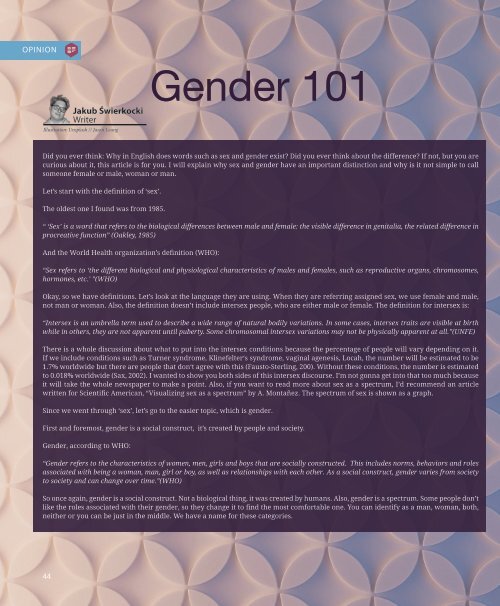OKTOBER_UNIKUM_WEB
You also want an ePaper? Increase the reach of your titles
YUMPU automatically turns print PDFs into web optimized ePapers that Google loves.
OPINION<br />
Gender 101<br />
Jakub Świerkocki<br />
Writer<br />
Illustration: Unsplash // Jason Leung<br />
Did you ever think: Why in English does words such as sex and gender exist? Did you ever think about the difference? If not, but you are<br />
curious about it, this article is for you. I will explain why sex and gender have an important distinction and why is it not simple to call<br />
someone female or male, woman or man.<br />
Let’s start with the definition of ‘sex’.<br />
The oldest one I found was from 1985.<br />
“ ‘Sex’ is a word that refers to the biological differences between male and female: the visible difference in genitalia, the related difference in<br />
procreative function” (Oakley, 1985)<br />
And the World Health organization’s definition (WHO):<br />
“Sex refers to ‘the different biological and physiological characteristics of males and females, such as reproductive organs, chromosomes,<br />
hormones, etc.’ ”(WHO)<br />
Okay, so we have definitions. Let’s look at the language they are using. When they are referring assigned sex, we use female and male,<br />
not man or woman. Also, the definition doesn’t include intersex people, who are either male or female. The definition for intersex is:<br />
“Intersex is an umbrella term used to describe a wide range of natural bodily variations. In some cases, intersex traits are visible at birth<br />
while in others, they are not apparent until puberty. Some chromosomal intersex variations may not be physically apparent at all.”(UNFE)<br />
There is a whole discussion about what to put into the intersex conditions because the percentage of people will vary depending on it.<br />
If we include conditions such as Turner syndrome, Klinefelter‘s syndrome, vaginal agenesis, Locah, the number will be estimated to be<br />
1.7% worldwide but there are people that don‘t agree with this (Fausto-Sterling, 200). Without these conditions, the number is estimated<br />
to 0.018% worldwide (Sax, 2002). I wanted to show you both sides of this intersex discourse. I’m not gonna get into that too much because<br />
it will take the whole newspaper to make a point. Also, if you want to read more about sex as a spectrum, I’d recommend an article<br />
written for Scientific American, “Visualizing sex as a spectrum” by A. Montañez. The spectrum of sex is shown as a graph.<br />
Since we went through ‘sex’, let’s go to the easier topic, which is gender.<br />
First and foremost, gender is a social construct, it’s created by people and society.<br />
Gender, according to WHO:<br />
“Gender refers to the characteristics of women, men, girls and boys that are socially constructed. This includes norms, behaviors and roles<br />
associated with being a woman, man, girl or boy, as well as relationships with each other. As a social construct, gender varies from society<br />
to society and can change over time.”(WHO)<br />
So once again, gender is a social construct. Not a biological thing, it was created by humans. Also, gender is a spectrum. Some people don’t<br />
like the roles associated with their gender, so they change it to find the most comfortable one. You can identify as a man, woman, both,<br />
neither or you can be just in the middle. We have a name for these categories.<br />
44

















